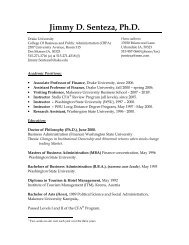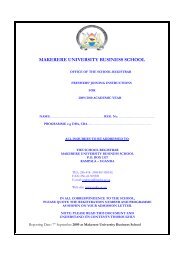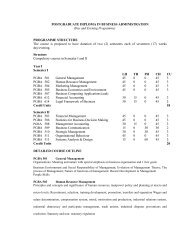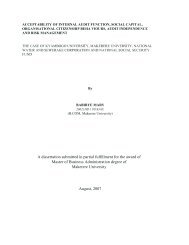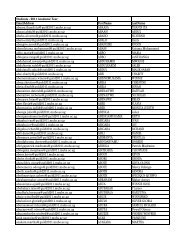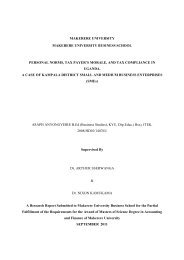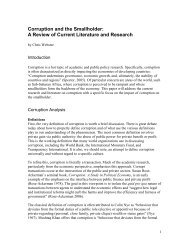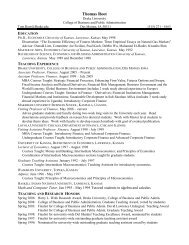13th Annual International Management Conference Proceeding
13th Annual International Management Conference Proceeding
13th Annual International Management Conference Proceeding
You also want an ePaper? Increase the reach of your titles
YUMPU automatically turns print PDFs into web optimized ePapers that Google loves.
2.0 THEORETICAL FRAMEWORK<br />
At the root of enterprise culture (Figure I) is a set of core characteristics (Figure 1) that are collectively valued<br />
by the community to meet its needs and interests in entrepreneurship idea generation. Enterprise culture exerts<br />
major pressures on individuals and enterprises to think and act in ways consistent with the culture. To<br />
positively influence entrepreneurial performance in a country, enterprise culture must be strong.<br />
a. Abundant positive roles images of<br />
successful independent businesses<br />
b. Opportunity to practice<br />
entrepreneurial attributes reinforced by<br />
society culture during formative years.<br />
Figure II: The Components of Enterprise Culture<br />
Enterprise Culture<br />
e. Provision formally and/or informally of<br />
knowledge and insight into the process of<br />
independent business management<br />
Source: Gibb, Allan A. (1988). Stimulating Entrepreneurship and New Business Development. <strong>International</strong> labour<br />
office INTERMAN Programme for promoting entrepreneurship and New Enterprise creation (UNDP (ILO<br />
Project INT/87/029) <strong>Management</strong> development Branch Training Department, Geneva 2 nd Impression 1991.<br />
This figure shows that motivation through “social engineering” (Gibb, 1988; Pareek and Rao, 1978) during formative<br />
years is important in developing enterprise culture through: provision of role models and images, and practice of<br />
entrepreneurial attributes reinforced during formative years. Those working in small businesses are more likely to<br />
establish businesses than those working in large firms. Familiarity with entrepreneurial phenomenon destroys some<br />
myths of unattainable business ownership (Khanka, 2004). Small businesses therefore, provide clear indicators in<br />
generating further enterprise. They acquaint those exposed to the phenomenon with independence to massage<br />
entrepreneurial attributes. Gibb contends that, those whose parents/relatives/friends own small business are more likely<br />
to set-up businesses than those without similar acquaintances or experience. Such relations also provide a network of<br />
acquaintances with market opportunities. Lastly, enterprise culture provides knowledge, and insight into independent<br />
business processes (Gibb, 1988). Members of a culture that supports individual business ownership are more likely to<br />
establish businesses. Therefore, the supportive ingredients in developing an enterprise culture are: strong social networks<br />
e.g. with suppliers and customers; leading to trustworthiness, credit provision; family vision to make members more<br />
business-focused; close knit families; ethnic entrepreneurship; no extravagance; political, and social good-will, and strong<br />
SMEs policy to encourage investment. The role that KIA plays/would play developing each enterprise culture<br />
component is italised in Figure IV:<br />
23<br />
c. Ample opportunity for familiarization<br />
with small businesses tasks especially<br />
during youth<br />
d. Network of independent<br />
business/family contracts and<br />
acquaintances reinforcing familiarity and<br />
providing market entry opportunities.




